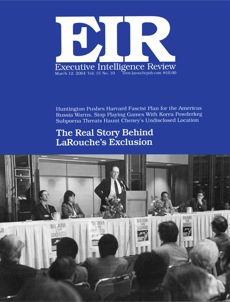The Night They Came To Kill Me
by Lyndon H. LaRouche, Jr.
“Convict him or kill him!” was the slogan of the “Get LaRouche” task force, whose operations began as early as 1973, continued in 1986, and led up to LaRouche’s imprisonment on trumped-up charges in 1989. The same forces behind those earlier assaults are excluding LaRouche from the Democratic Party’s electoral process in this year’s Presidential election.
LaRouche’s Fateful Debate with Abba Lerner
SDI and the Jailing of Lyndon LaRouche
by Paul Gallagher
A chronology of the events by which LaRouche’s successful intervention into the events of national and global policy in 1982-83, brought the Soviet reaction which led to his imprisonment.
FEC Figures Show LaRouche With Broadest Base of Support
by Anita Gallagher
Economics
‘Remittances’ and Labor Recycling: Harvard’s Fascist Policy for the Americas
by Paul Gallagher
The call by Harvard’s Samuel Huntington for a clash of civilizations war against Hispanic immigrants, points to an underlying fascist economic policy, which goes under the name of “immigration facilitation and workers’ remittances.”
Huntington Raves Again: Watch Out for a New Cheney War!
by Gretchen Small
A Fanatic of Cultural War
Battle Lines Drawn in Argentina-IMF Showdown
by Cynthia R. Rush
Documentation: From Argentine President Néstor Kirchner’s March 1 speech to the Legislative Assembly.
‘Argentina Must Grasp The Global Crisis’
by Lyndon H. LaRouche, Jr.
An interview with Lyndon LaRouche on Argentine radio.
Business Briefs
International
Stop Playing Football With Korea Powderkeg, Says Russia
by Kathy Wolfe
The Six-Power Talks on Korea adjourned in stalemate, as a result of the U.S. demand that North Korea simply give up all nuclear programs, including peaceful nuclear power. Russian spokesmen warn that this could “could raise the possibility of military intervention.”
Legality of Iraq War Challenged in Britain
by Mark Burdman
Attempt To Trigger Civil War Fails in Iraq
by Muriel Mirak-Weissbach
Why Afghanistan Is Becoming a Narco-State
by Ramtanu Maitra
Palestinians Need Viable Political Solution
by Carl Osgood
Dr. Hanan Ashrawi speaks in Washington.
Saakashvili’s Roses Not Yet Wilted in U.S. Visit
by William Jones
Conference Report
Europe’s Mission: Build a Future for 6 Billion People
by Helga Zepp-LaRouche
Helga Zepp-LaRouche, chairman of the Civil Rights Movement Solidarity political party in Germany, gave this keynote speech to the party’s national convention on Jan. 25, to outline the perspectives for the party’s participation in the European Parliament elections.
Books
Benjamin Franklin Was No ‘Practical Man’
by Nancy Spannaus
Benjamin Franklin, by Edmund S. Morgan; and Benjamin Franklin, an American Life, by Walter Isaacson.
Smithson and Adams: The Will to Promote American Science
by Marsha Freeman
The Stranger and the Statesman, by Nina Burleigh.
National
LaRouche: For Fair Elections, Ban Computer Voting Now!
by Edward Spannaus
The idea, LaRouche said, is “to eliminate the use of computer-controlled voting devices— absolutely!” This is necessary because computerized voting machines, by their nature, cannot be audited.
As LaRouche Forecast, the Race Is Now Down to Kerry and Him
by Nancy Spannaus
Subpoena Threats Haunt Cheney and White House
by Michele Steinberg
From ‘War on Terror’ to ‘Climate Warfare’
by Ralf Schauerhammer
A new psychological warfare campaign from the utopian Pentagon shop of Andrew Marshall.
Congressional Closeup
by Carl Osgood
National News
Departments
Editorial
Rohatyn, or LaRouche?



